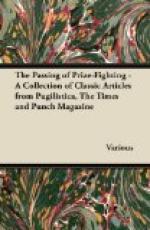“On Sunday one British pilot, flying at 1,000 ft., saw four hostile craft at about 5,000 ft., and dived more than a mile directly at them. As he whirled past the nearest machine he opened fire, and saw the observer crumple up in the fusselage as the pilot put the machine into a steep live.”—Dally Sketch.
While confessing ignorance
as to the exact nature of a “live,”
we are sure it is not as steep
as the rest of the story.
* * * * *
A MUSCULAR CHRISTIAN.
“Vicar, Compton Dando,
Bristol, would Let two Fields, or few
Yearlings could run with him.”—Bristol
Times and Mirror.
* * * * *
[Illustration: THE PERSONAL EQUATION.
Time 1940.
“WHAT DID YOU DO IN THE GREAT WAR, GRANDPA?” “WHAT DID I DO, MY LAD? I HELPED TO RELIEVE MAFEKING.”]
* * * * *
THE MUSINGS OF MARCUS MULL.
(IN THE MANNER OF AN ILLUSTRIOUS MENTOR.)
I.
I noted in last week’s issue the persistence of the strange story that Mr. GLADSTONE, in his wrath at his reduced majority in Midlothian, broke chairs when the news arrived. I was careful to add that, as the result of searching investigation, I was in a position to state that Mr. GLADSTONE never did any such thing. Still I cannot altogether regret having alluded to the story in view of the interesting letters on the subject which have reached me from a number of esteemed correspondents.
II.
As an eminent Dundonian divine, who wishes to remain anonymous, remarks, it is a melancholy fact that men of genius have often been prone to violent ebullitions of temper. He recalls the sad case of MILTON, who, while he was dictating his Areopagitica, threw an ink-horn at his daughter, “to the complete denigration of her habiliments,” as he himself described it. Yet MILTON was a man of high character and replete with moral uplift. I remember that my old master, Professor Cawker of Aberdeen, once told me that as a child he was liable to fits of freakishness, in one of which he secreted himself under the table during a dinner-party at his father’s house and sewed the dresses of the ladies together. The result, when they rose to leave the room, was disastrous in the extreme. But Professor Cawker, as I need hardly remind my readers, was a genial and noble-hearted man. I presented him on his marriage with a set of garnet studs. Ever after when I dined at his house he wore them. Nothing was ever said between us, but we both knew, and I shall never forget.




